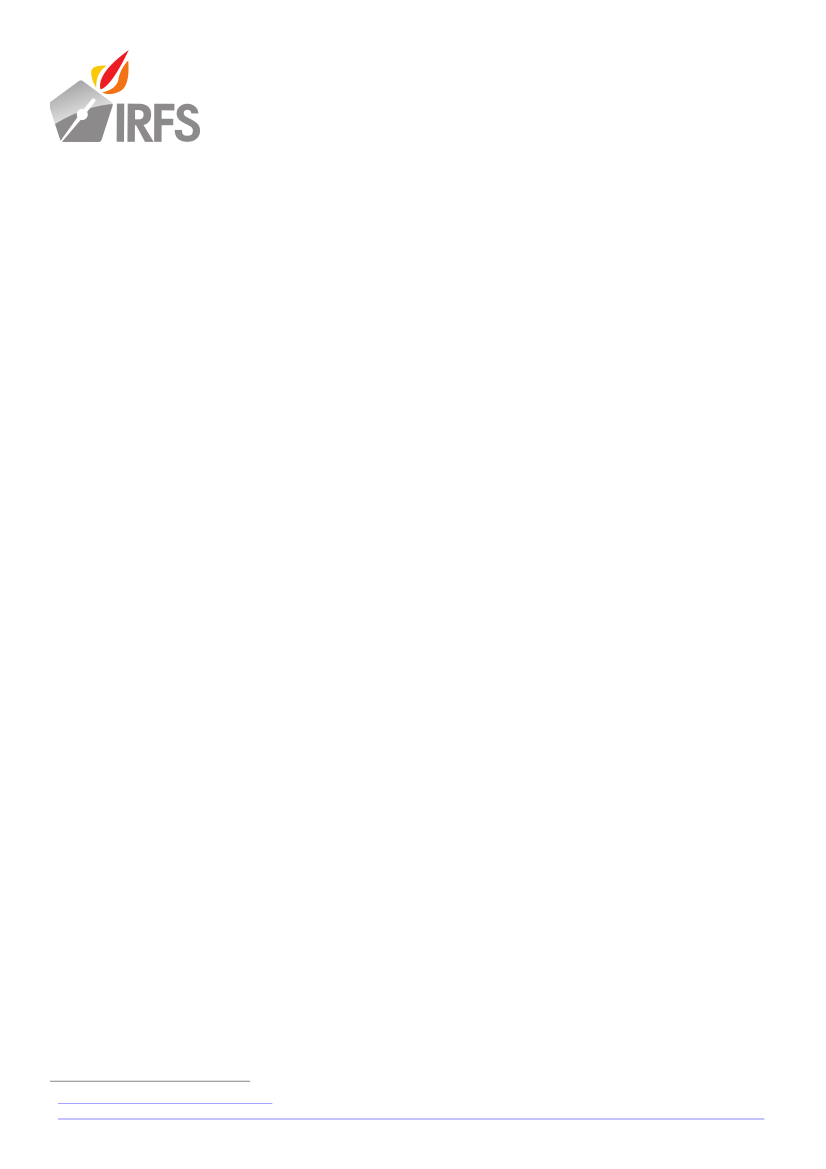Udenrigsudvalget 2013-14
URU Alm.del Bilag 67
Offentligt
w
w
w
.
i
r
f
s
.
o
r
g
TO:
Mr.
Holger
K.
Nielsen,
Minister
for
Foreign
Affairs
CC:
Members
of
Danish
Parliament;
Members
of
Danish
Government
December
13,
2013
APPEAL
Weak
document
undermines
human
rights
and
civil
society
work
in
the
Eastern
Partnership
countries
Your
Excellency,
We
are
writing
to
express
our
deep
concern
regarding
the
Danish
Neighborhood
Programme
2013-·‐2017,
the
document
which
clearly
lacks
long-·‐term
strategic
vision
for
the
Eastern
Partnership
region
and
undermines
international,
regional
and
national
efforts
to
promote
human
rights
and
democratization
in
this
complex
but
important
region.
At
the
same
time,
we
would
like
to
enquire
about
Danish
government’s
strategy
for
human
rights
and
democratization
in
Azerbaijan
over
the
next
few
years.
While
Sweden,
Norway,
Netherlands
and
other
European
countries
consistently
backed
the
human
rights
and
civil
society
work
in
Azerbaijan,
Denmark
has
chosen
a
different
approach.
As
evidenced
by
exclusion
of
Azerbaijan
as
a
country
from
the
Danish
Neighborhood
strategy,
the
Danish
government
seems
to
be
less
concerned
about
human
rights
and
democratization
when
it
comes
to
Azerbaijan
than
other
countries
of
the
Eastern
Partnership.
The
Danish
Neighborhood
Programme
2013-·‐2017
sets
Armenia,
Belarus,
Moldova
and
Ukraine
as
priority
countries
for
Danish
development
assistance
in
the
Eastern
Partnership
region,
passing
Azerbaijan
and
Georgia.
In
the
light
of
recent
political
developments
around
Vilnius
summit,
this
choice
has
proved
to
be
a
failure.
Rather
than
signing
and
initialing,
Ukraine
and
Armenia
rejected
an
Association
Agreement
with
the
European
Union.
Due
primarily
to
Russian
pressure,
Armenian
President
Sarkisjan
declared
in
September
that
his
country
would
not
sign
the
agreement
and
would
join
the
Eurasian
Customs
Union
instead1.
Azerbaijan
is
currently
negotiating
the
contours
of
its
own
partnership
track
with
the
EU,
and
the
international
community
continues
to
encourage
Azerbaijan
to
build
the
democratic
and
economic
institutions
and
conduct
the
reforms
necessary
for
a
deeper
relationship
with
the
Euro-·‐Atlantic
community.
As
a
civil
society,
we
believe
that
a
democratic,
prosperous
and
secure
Azerbaijan
will
benefit
not
only
the
Azerbaijani
people
but
also
its
neighbors,
i.e.
Armenia
and
Georgia.
There
is
certainly
a
space
for
Denmark
to
play
a
role
here,
and
we
call
on
the
Danish
government
to
revisit
Danish
Neighborhood
Programme
2013-·‐2017,
and
immediately
start
negotiations
with
Azerbaijani
civil
society
vis-·‐à-·‐vis
promotion
of
human
rights
and
good
governance.
We’ve
been
lacking
that
Danish
government
attention
and
support
since
the
of
media
and
democratization
program
funded
by
Danida,
and
implemented
by
International
Media
Support
(NB:
program
ended
in
2012).
In
the
meantime,
we
call
on
your
ministry
to
closely
monitor
implementation
of
the
new
Danida’s
Technical
Assistance
to
the
Media
and
Democratisation
Programme
in
the
Eastern
Partnership
Countries
and
Turkey
(2012-·‐2016)2
.
We
have
serious
concerns
over
design
and
implementation
of
this
action.
It
has
been
a
year
now
since
the
12
http://www.eurasianet.org/node/67482http://um.dk/en/danida-en/activities/business/contracts/long/contracts-awarded-by-danida2/contracts-awarded-by-danida-2012/
program
start,
but
no
serious
move
has
been
made
to
fulfill
the
program
objectives.
To
the
contrary,
wrong,
regressive
decisions
have
been
adopted
by
the
agency
managing
the
grant.
One
of
those
strategically
wrong
decisions
was
the
decision
to
exclude
Azerbaijan
from
the
program.
This
decision
has
been
made
without
any
consultations
with
civil
society
in
Azerbaijan.
In
the
light
of
above-·‐mentioned,
we
are
deeply
disappointed
with
the
decision
of
Danida
to
trust
important
human
rights
and
democratization
project
to
the
consultancy
company
with
strong
business
interests
in
region,
Niras,
which
continues
to
ignore
Azerbaijani
civil
society
calls
for
cooperation,
despite
of
the
initial
commitment
to
work
with
these
NGOs.
When
a
human
rights
NGO
sends
numerous
work-·‐related
emails
to
the
company,
trusted
by
Danida
to
manage
Danish
tax
payers
funds,
and
does
not
receive
a
single
reply,
then
there
is
a
big
question
mark
over
this
company
competencies
and
competencies
of
those
at
Danida
who
made
a
funding
decision
vis-·‐à-·‐vis
this
company.
From
our
perspective—and
please
forgive
us
if
we
are
speaking
in
ignorance-·‐
there
had
been
a
lack
of
research/
assessment
and
consultations
with
local
media
and
civil
society,
prior
to
making
this
funding
decision.
Denmark's
development
cooperation
is
laid
down
and
administered
on
the
basis
of
the
Danish
Act
on
International
Development
Cooperation
(Consolidated
Act
no.
541
of
10/07/1998).
In
line
with
the
Act
on
International
Development
cooperation,
the
Government
every
year
presents
to
the
Parliament
its
plan
and
priorities
for
Danish
development
assistance
for
the
coming
five
year
period.
We
therefore
call
on
your
Ministry
to
revisit
the
Danish
Neighborhood
Programme
2013-·‐2017,
which
proved
to
be
a
weak
document,
design
a
new
action
plan
and
submit
it
to
the
discussion
of
the
Parliament
as
soon
as
it
possible.
A
new
Act
on
International
Development
Cooperation
(Act
no.
555
of
18/06/20125)
was
adopted
by
Parliament
in
May
2012
and
entered
into
force
on
1
January
2013.
Increased
transparency
both
at
partner
country
level
as
well
as
in
Denmark
is
a
key
element
in
the
act.
We
therefore
urge
you
to
engage
in
close
monitoring
of
the
implementation
of
the
Danida’s
Technical
Assistance
to
the
Media
and
Democratisation
Programme
in
the
Eastern
Partnership
Countries
and
Turkey
(2012-·‐2016)
and
make
public
all
the
information
related
to
the
execution
of
the
program
since
it
started
in
December
2012.
Finally,
we
urge
your
Ministry,
and
Danida
in
particular,
to
engage
in
direct
and
constructive
communication
with
the
civil
society
of
Azerbaijan.
Thank
you
very
much
for
your
consideration
of
this
appeal.
Yours
sincerely,
Emin
Huseynov
Chairman
and
CEO
Institute
for
Reporters’
Freedom
and
Safety
Baku,
AZ-·‐1114
85/86
R.Behbudov
street
Ofc:
+99412
4933181;
+99
450
2823420
Journalist’
safety
hotline:
+99
412
4087530
Email:
[email protected]
www.irfs.org


